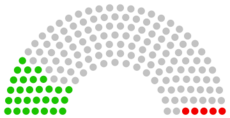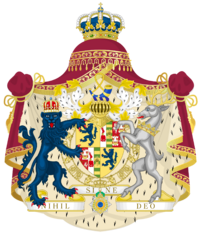Reichssenat: Difference between revisions
No edit summary |
No edit summary |
||
| Line 64: | Line 64: | ||
==Tasks and duties== | ==Tasks and duties== | ||
=== | |||
The role of the Reichssenat is described by Article 43 and 44 of the [[Constitution of Mascylla]] as follows: "Through the Reichssenat, the states and free cities participate in federal legislation and administration and in matters relating to governmental policy and decisionmaking." The states, represented by their respective governments and legislatures, operate in the Reichssenat and are able to shape and influence the aforementioned fields, while the styles of such participation are not determined and therefore ambiguous. | |||
The [[Elbgau Confederacy|National Council]] (''Nationsrat'') in 1793 frst proposed the name ''Länderkammer'' ('Chamber of States'), in tandem with the also proposed name ''Volkskammer'' ('Chamber of the People') for the [[Reichsrat]], but it was later rejected in favor of its current terminology. Today still the Reichssenat is referred to as an "second house" or "''Länderkammer''" and in some cases as a full fledged {{wp|parliamentary system|upper house}} of legislature internationally. However, the Reichssenat is described as a sovereign constitutional body according to the constitution and in opposition to most countries "is not a second chamber of a uniform legislative body that would be set equal to the 'first chamber' regarding lawmaking." | |||
===Legislation=== | |||
====Consent laws==== | |||
====Opposition laws==== | |||
===Exceptions=== | |||
===Other tasks and responsibilities=== | |||
==Organisation== | ==Organisation== | ||
===President and presidency=== | ===President and presidency=== | ||
Revision as of 13:56, 3 September 2020
This article is incomplete because it is pending further input from participants, or it is a work-in-progress by one author. Please comment on this article's talk page to share your input, comments and questions. Note: To contribute to this article, you may need to seek help from the author(s) of this page. |
Mascyllary Reichssenat Maskillischer Reichssenat | |
|---|---|
| Leadership | |
Vice President | Dietmar Kranz, ABP since 17 November 2018 |
| Structure | |
| Seats | 163 |
 | |
Political groups | Government (29)
Neutral (129)
Opposition (5)
|
| Elections | |
| Mixed-member proportional representation (MMP) | |
Last election | 1 October 2016 |
Next election | February 2021 |
| Meeting place | |
 | |
| Former Elbgau Council building, Königsreh, Mascylla | |
The Reichssenat (Hesurian pronunciation: [ˈʁaɪçsse:na:t], ‘Imperial Senate’) is the federal parliament of the subnational divisions and upper house of the legislature of Mascylla. The Reichsrat is a legislative body that represents the 21 Reichsländer and Freie Städte, consisting of 163 members known as Representatives of the Reichssenat (Repräsentanten des Reichssenats), which are decided through a chosen delegation of the represented state, and or a general election every six years. The composition of the delegation varies from the state's population, political makeup and ruling majority (or coalition) of each state legislature.
Since its foundation in 1789 under the Kingdom of Aldia in Augusthal, it has met in various location, and today sits at the former Elbgau Council building in Königsreh. It is represented by the office of the President of the Reichssenat (Präsident des Reichssenats), currently occupied by Egon Weidmann since 2019, of which its holder is directly voted from the Reichssenat itself. Representatives of the Reichssenat are usually chosen by a state-own delegation, but can be partially subject to popular vote by the state's population as well. The Reichssenat can operate with a minimum number of 160 seats, whith the number of delegation seats per state dependent on its population to achieve proportional representation. An unique occasion where an Election Day can be called earlier than two years after the last election arises when the Prime Minister loses a vote of confidence and asks the President of the Reichssenat to dissolve the parliament in order to allow new state elections afterwards.
During the War of the Five Kings, the Reichssenat was the offical assembly of the sovereigns and elected commoners of the states which were part of the Elbau Confederation (1793–1798). When Mascylla was founded, it became the established, sometimes described, upper house of parliament.
Tasks and duties
The role of the Reichssenat is described by Article 43 and 44 of the Constitution of Mascylla as follows: "Through the Reichssenat, the states and free cities participate in federal legislation and administration and in matters relating to governmental policy and decisionmaking." The states, represented by their respective governments and legislatures, operate in the Reichssenat and are able to shape and influence the aforementioned fields, while the styles of such participation are not determined and therefore ambiguous.
The National Council (Nationsrat) in 1793 frst proposed the name Länderkammer ('Chamber of States'), in tandem with the also proposed name Volkskammer ('Chamber of the People') for the Reichsrat, but it was later rejected in favor of its current terminology. Today still the Reichssenat is referred to as an "second house" or "Länderkammer" and in some cases as a full fledged upper house of legislature internationally. However, the Reichssenat is described as a sovereign constitutional body according to the constitution and in opposition to most countries "is not a second chamber of a uniform legislative body that would be set equal to the 'first chamber' regarding lawmaking."
